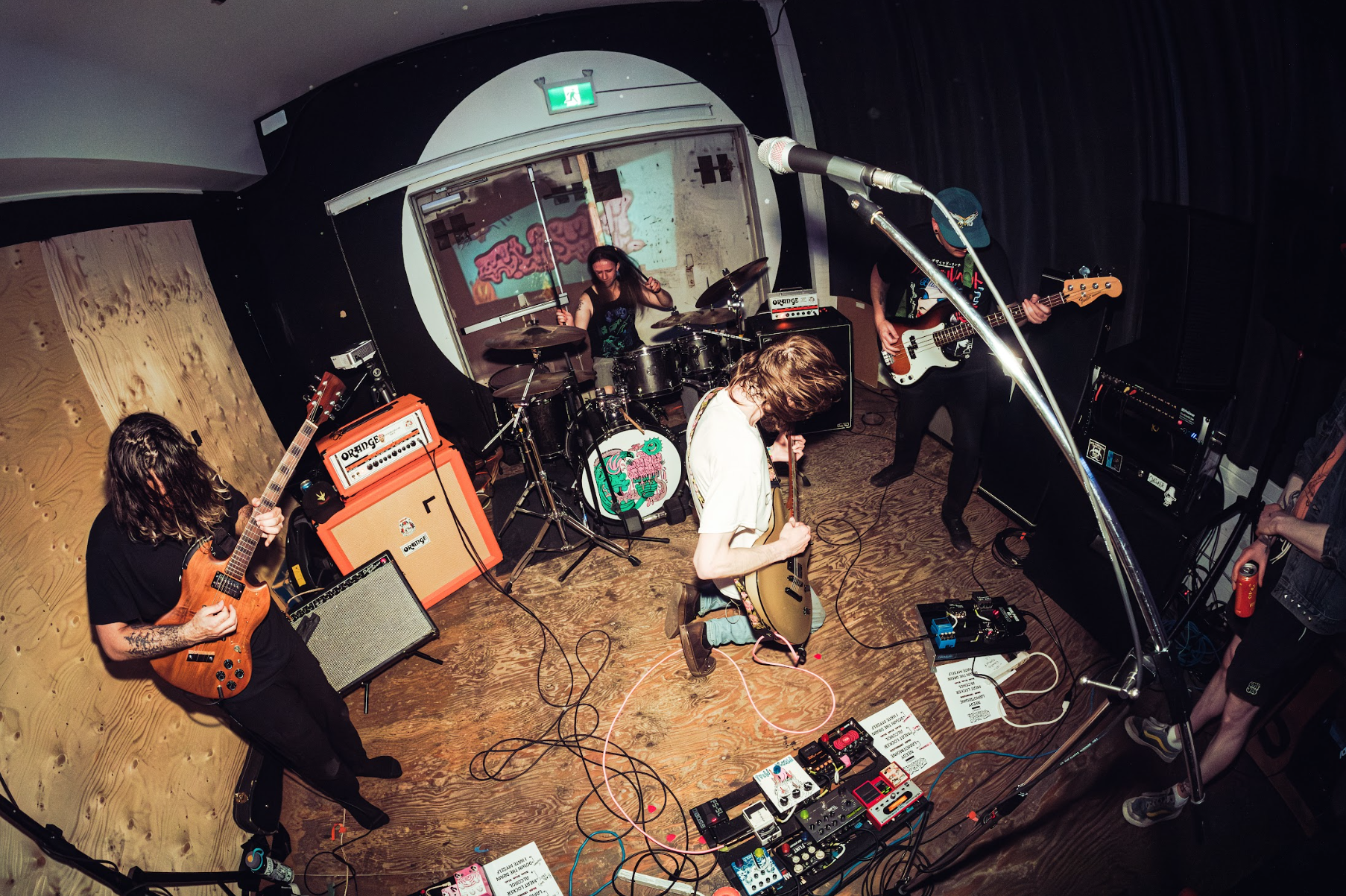The Grief, Grit and Genuine Connection Behind G.U.S.H.’s Record I Hate Myself
G.U.S.H. at Loophole Coffee Bar. Photo credit: Daman Singh.
Roger LeBlanc, singer, guitarist and songwriter for grunge-pop band G.U.S.H. greets me with a warm smile and sincere handshake and sends me away a couple of hours later with an equally warm and sincere embrace. He’s a generous guy with the charisma of someone that casually straddles both music and film industries as both a working actor and the front man for a rock band.
We discuss the band’s latest album I Hate Myself, his background in acting and his influences. He opens up throughout our conversation and his sincerity, it becomes clear, is a key component of both his acting and music ethos.
“My life experience has been difficult and I can draw on those experiences, but I also have that Kurt Cobain attitude instilled in me” he explains. “Fuck you, you can’t tell me to be a different person… and if you don’t fucking like it, then don’t cast me [in acting roles]. What people really respond to is being genuine and that’s what’s helped.”
Kurt Cobain is a name that will come up often during our chat and it’s clear that the late grunge icon has been a key piece in LeBlanc’s musical development, both in performance and in his own philosophy.
“In Utero is as close as you’ll get to being in the room with Nirvana, that one song, ‘Endless, Nameless’ it’s a jam of fucking anger, but it’s not directed at anyone, it’s directed at [Cobain] and that’s what’s so powerful, if he feels this way about himself that allows me to feel that way about myself and find some sort of catharsis.”
That ‘music-as-act-of-catharsis’ philosophy applied to the making of his own album. Cobain was devastating in his soul-bearing and introspection, a bearer of the at-times vicious self-flagellation LeBlanc alludes to. LeBlanc’s honesty leads our conversation into a more reflective territory. Many of the band’s songs are a reflection of LeBlanc’s own experience of the sometimes-devastating impacts of mental illness.
“I’m not here to say that all art has to be suffering,” he explains, “but the stuff that matters to me and adds value to my life experience is the stuff that deals with that.”
His own experience with a close friend’s suicide was a touchstone in the making of this record, as LeBlanc left Calgary for the U.S., in hopes to put some physical and emotional distance between himself and his grief or as he puts it “in a selfish way, it was therapy for me, I went to Michigan to kill those things.“
It turned out that the I Hate Myself recording sessions acted as the release LeBlanc was searching for. In writing and recording, he was able to reckon with some of the regret that so often presents itself during the grieving process.
“[The song] ‘Down The Drain’ is about my best friend, we hadn’t talked in two or three months because life is busy, I found out he’s passed away and I never got to say goodbye, I structure the verses are him talking and chorus is me talking to him and saying goodbye: It was good to know you my friend I know you fought until the end”
G.U.S.H. at Loophole Coffee Bar. Photo credit: Daman Singh.
LeBlanc poured himself into the recording process, as he hooked up with local producer Josh Schroeder, who’d established himself working with high-profile local bands like Lorna Shore and King 810 and drummer David Horrocks, who also contributed some of the record’s lead guitar parts. Schroeder would play a big role in shaping LeBlanc’s vocal performances and supporting his journey into a “cleaner” singer, as LeBlanc began his band-life as the lead growler in a Calgary-based black metal band.
While dealing with his grief during the writing and recording of the album, he also used the opportunity to confront his own struggles with mental illness and addiction with renewed vigour.
“I wanted it to be a conversation piece. For me it has to be active listening. The albums I like are a snapshot of the time. I think the message would that it’s okay to be fucked up. It’s okay to admit that you’re fucked up because that is the only way you move forward. Yeah, I hate myself but what can I do about it?”
“What can I do about it?” For LeBlanc, I Hate Myself is his answer, the nine songs form part of a conversation with the listener and essentially an extension of the conversation he was having with himself. In the exchange between LeBlanc and the listener, suddenly both him and the listener are no longer alone. In this shared experience, stigma and judgment are absent.
When LeBlanc recorded these songs he would ask himself, “Who am I talking to? Who is on the other side of this mic that I’m trying to have a conversation with?” Through this exercise, he found it easier to discuss these feelings of low self-worth, “even if it’s just one [listener] who’s going to go ‘I’m gonna get help,’ that’s so important to me.”
It’s a concept LeBlanc connects with in particular during live performances, when the crowd sings along to these deeply personal and intimate lyrics, it feels like the actualization of his hopes that his music will help destigmatize these negative feelings. What once were his songs of private inner turmoil are now shared amongst an empathetic community.
As I leave, I ask LeBlanc what’s the main message of I Hate Myself. He smiles, “The album? If you’re a weirdo, you’re welcome.”
Dickens and REVERIE are proud to present Austin, Texas protest punk metal act BÖNDBREAKR on September 5, with support from G.U.S.H., Medusas and Bottom Feeder. Tickets are $21.05 and available on EventBrite. Doors are at 8 p.m.



